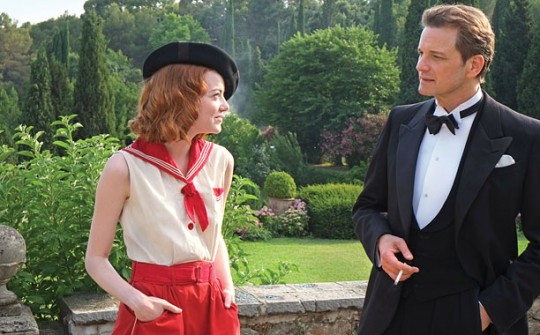Wed 30 Jul 2014
Out of ‘Magic’
Posted by admin under Film Review, NYC Film Critic
Comments Off on Out of ‘Magic’
Quick takes on two smaller movies, now in theaters.
Magic in the Moonlight
I’m mostly alone in finding one of Woody Allen’s finest late-career efforts to be 2010’s You Will Meet a Tall Dark Stranger, in which the eternal pessimist strands a collection of characters in hells of their own making. In the ongoing battle between cynicism and optimism that courses through so many of Allen’s works, cynicism won that round. Initially, it seems set to triumph in the writer/director’s latest film, Magic in the Moonlight, as well as the central character—a dour magician (Colin Firth) who longs to believe in the existence magic, but can’t bring himself to surrender to that kind of fancifulness—has his prejudices upended by a pretty medium (Emma Stone) who appears to have a direct link to the spiritual world. Her youthful enthusiasm (and beauty) coupled with the lovely setting (’20s era rural France, specifically the sun-dappled Côte d’Azur) leads him to drop his cynical guard and believe that he’s finally in the presence of someone truly magical.
It’s clear early on that Allen is setting this poor guy up for a fall from grace, so when the plot twist happens, it’s not especially surprising. What is surprising, however, is that the filmmaker’s softer side wins out in the end, as the movie becomes the kind of goopy romance it sets out seeming to avoid. Worse still, Allen’s stodgy script starts to literalize the movie’s thematic debate between believers and non-believers, with Firth called up on to deliver horrendously on-the-nose lines that inspire deep cringes rather than deep thoughts. (Fortunately, the British actor has a solid track record for making clunky speeches sound natural.) Magic‘s mid-point collapse is especially unfair for the movie’s two stars, both of whom gamely squabble in the early sections of the movie before they’re required to unconvincingly fall in love. I will say that Magic in the Moonlight is far less oppressive than Blue Jasmine, Allen’s Streetcar Named Desire-riff that won Cate Blanchett an overdue Best Actress Oscar, but overall proved to be a mostly unpleasant viewing experience. This one is lighter and frothier, as if begging to be referred to as a throwback to Allen’s “earlier, funnier” comedies. Maybe it’s just my own cynicism showing, but I would have preferred to see the “later, meaner” version.
The Almost Man
Fatherhood seems like a real horrorshow in this Norwegian comedy about a man-child reluctant to move out of his overgrown adolescent phase despite the fact that he has a baby on the way with his longtime girlfriend. Henrik Rafaelsen stars as the immature adult that Seth Rogen or Jay Baruchel might play in the inevitable Hollywood remake, though he’s more traditionally handsome than either of those professional clowns. As the infant’s due date inches ever closer, Rafaelsen starts to act out his fears through some good old-fashioned emotional and intellectual regression. He’s spending more and more time around his single and loving it buddies, he’s knocking back increasingly large amounts of alcohol, he goofs off at work and he makes poorly thought-out jokes about “raping” his girlfriend, as if she owes him sex. She’s understandably wigged out by his behavior, which only seems to encourage him to act crazier, perhaps out of the hope that she’ll kick him to the curb and absolve him of anything resembling responsibility. To his credit, director Martin Lund doesn’t ask us to find Rafaelsen sympathetic, which would be a near-impossible task considering some of the stunts he pulls. Instead, the movie is thoughtful serio-comic, if somewhat superficial, study of behavior and the way a specific kind of person acts when confronted with a major lifestyle change. Having been in the same “New Dad” position as Rafaelsen’s character myself once, I can understand some—if not all—of his actions and enjoyed the movie as a cautionary tale about what not to do when you’re expecting.


No Responses to “ Out of ‘Magic’ ”
Sorry, comments for this entry are closed at this time.